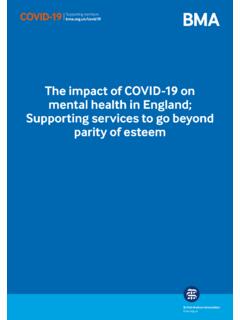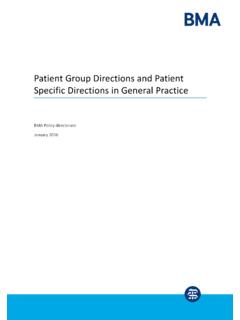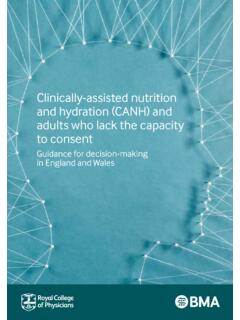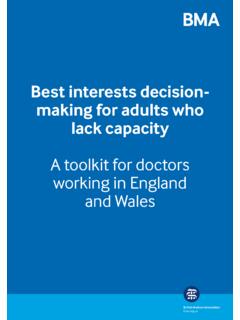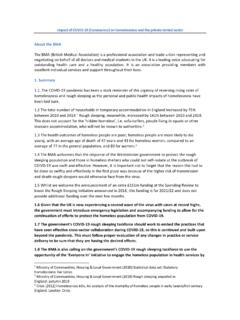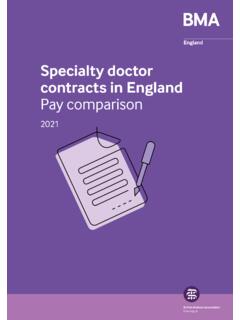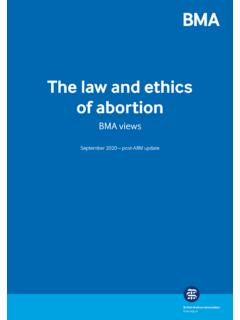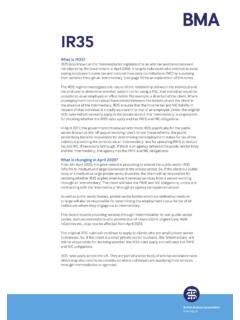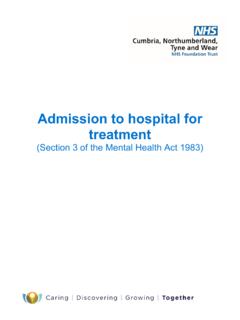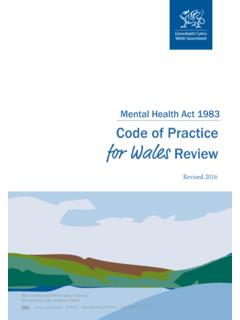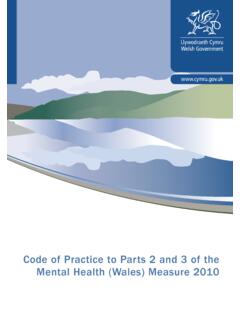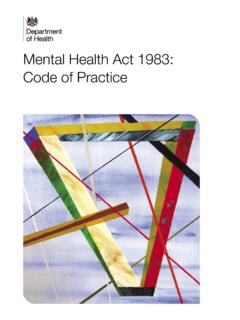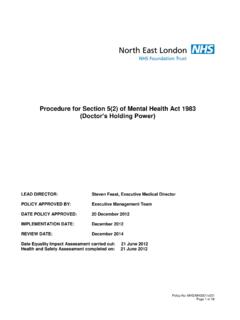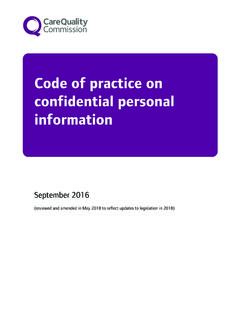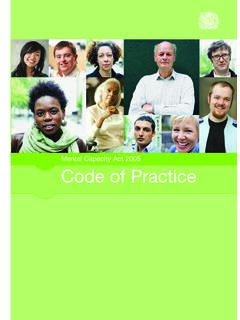Transcription of Mental Capacity Act tool kit - British Medical Association
1 Mental Capacity Act tool kitFe b r u a r y 2016 British Medical Association1 Mental Capacity Act tool kitAbout this tool kitThe Mental Capacity Act 2005 provides a legal framework in England and Wales for decision making on behalf of people aged 16 or over who cannot make decisions themselves. It also sets out the law for people who wish to make preparations for a time in the future when they may lack Capacity to make purpose of this tool kit is to act as a prompt to doctors when they are providing care and treatment for people who lack, or who may lack, the Mental Capacity to make decisions on their own behalf. In our view, this is likely to be the majority of doctors.
2 The tool kit consists of a series of cards relating to specific areas of the Act, such as how to assess Capacity , the Act s basic principles, advance refusals of treatment, research and Lasting Powers of Attorney (LPAs). Although each of the cards refers to separate areas of the Act, there is inevitably a degree of tool kit is not intended to provide definitive guidance on all the issues surrounding the Mental Capacity Act. Card 1 lists alternative sources of guidance that should be used in conjunction with the cards. In cases of doubt, legal advice should be sought. The tool kit is designed to raise doctors awareness of the Act, and to provide an aid for good decision tool kit applies to England and Wales.
3 In Scotland, decision making in this area is covered by the Adults with Incapacity (Scotland) Act 2000. In Northern Ireland, decision making is currently governed by the common law, although at the time of writing change was Medical Association2 Mental Capacity Act tool kitThe tool kit is available on our website. Trusts, Medical schools and individual doctors may download and adapt it to suit their own requirements. There are no copyright restrictions on this tool kit please feel free to make multiple welcome feedback on the usefulness of this tool kit. If you have any comments please address them to: Medical Ethics Department British Medical Association BMA HouseTavistock Square London WC1H 9JP Tel: 020 7383 6286E mail: Website: 1 Guidance on the Mental Capacity ActThe website of the Social Care Institute for Excellence provides up to date resources on all aspects of the Mental Capacity Act.
4 In addition the following publications provide more detailed information:Assessment of Mental Capacity , British Medical Association and The Law Society (4th edition).Code of Practice: Mental Health Act 1983, Department of Health. Deprivation of Liberty Safeguards. British Medical Association . Medical Ethics Today: The BMA s Handbook of Ethics and Law, British Medical Association (2012). Mental Capacity Act 2005 Code of Practice,Office of the Public Guardian (2007). 12 Card 2 General information1 The Mental Capacity Act 2005 The Mental Capacity Act 2005 provides a comprehensive framework for decision making on behalf of adults aged 16 and over who lack Capacity to make decisions on their own behalf.
5 The Act applies to England and Wales. Scotland has its own legislation, the Adults with Incapacity (Scotland) Act 2000. The approach in Northern Ireland is currently governed by the common law, although at the time of writing, change was anticipated. The Act applies to all decisions taken on behalf of people who permanently or temporarily lack Capacity to make such decisions themselves, including decisions relating to Medical treatment. All doctors working with adults who lack, or who may lack, Capacity will need to be familiar with both its underlying principles and its basic provisions. This tool kit sets out the main features of the Act in so far as it relates to decisions about Medical treatment.
6 The Act is accompanied by a statutory Code of Practice providing guidance on how it should be used. Certain people have a legal duty to have regard to the guidance in the Code of Practice, including anyone acting in a professional Capacity or being paid for their work with people who may lack Capacity . It is therefore essential that health professionals are familiar with the Code of Medical Association5 Mental Capacity Act tool kit2 What is Capacity ? Decision making Capacity refers to the everyday ability that individuals possess to make decisions or to take actions that influence their life, from simple decisions about what to have for breakfast, to far reaching decisions about serious Medical treatment.
7 In a legal context it refers to a person s ability to do something, including making a decision, which may have legal consequences for the person themselves or for other When does a person lack Capacity ? For the purpose of the Act a person lacks Capacity if, at the time the decision needs to be made, he or she is unable to make or communicate the decision because of an impairment of, or a disturbance in the functioning of, the mind or brain . The Act contains a two-stage test of Capacity : is there an impairment of, or disturbance in the functioning of, the person s mind or brain? If so: is the impairment or disturbance sufficient that the person is unable to make that particular decision?
8 In practice it can be helpful to ask three questions:1. Does the person have an impairment of, or a disturbance in the functioning of, their mind or brain?2. Is the person unable to make a specific decision at the time it needs to be made for one or more of the reasons given in the Act? (See card 5(2))3. Is the person s inability to make the specific decision at the time it needs to be made because of the aforementioned impairment or disturbance in the person s mind or brain? British Medical Association6 Mental Capacity Act tool kit The assessment of Capacity is task specific . It focuses on the specific decision that needs to be made at the specific time the decision is required.
9 It does not matter if the incapacity is temporary, or the person retains the Capacity to make other decisions, or if the person s Capacity fluctuates. The inability to make a decision, however, must be a result of the impairment or disturbance already mentioned. This could be the result of a variety of factors, including Mental illness, learning disability, dementia, brain damage, or intoxication. The important point is that the impairment or disturbance renders the individual unable to make the decision in question. If the impairment is temporary and the decision can realistically be put off until such time as he or she is likely to regain Capacity , then it should be deferred.
10 While it is clear that an unconscious patient will lack Capacity , most other categories of patient will retain some decision-making Capacity , however 3 Basic principles1 What are the Act s basic principles? The Act sets out a number of basic principles that must govern all decisions made and actions taken under its powers. These are rooted in best practice and the common law and are designed to be fully compliant with the relevant sections of the Human Rights Act. Where confusion arises about how aspects of the Act should be implemented, it can be extremely helpful to refer back to them. Actions or decisions that clearly conflict with them are unlikely to be lawful, although there may be occasions on which they are in tension with each other, and some balancing will be required.
